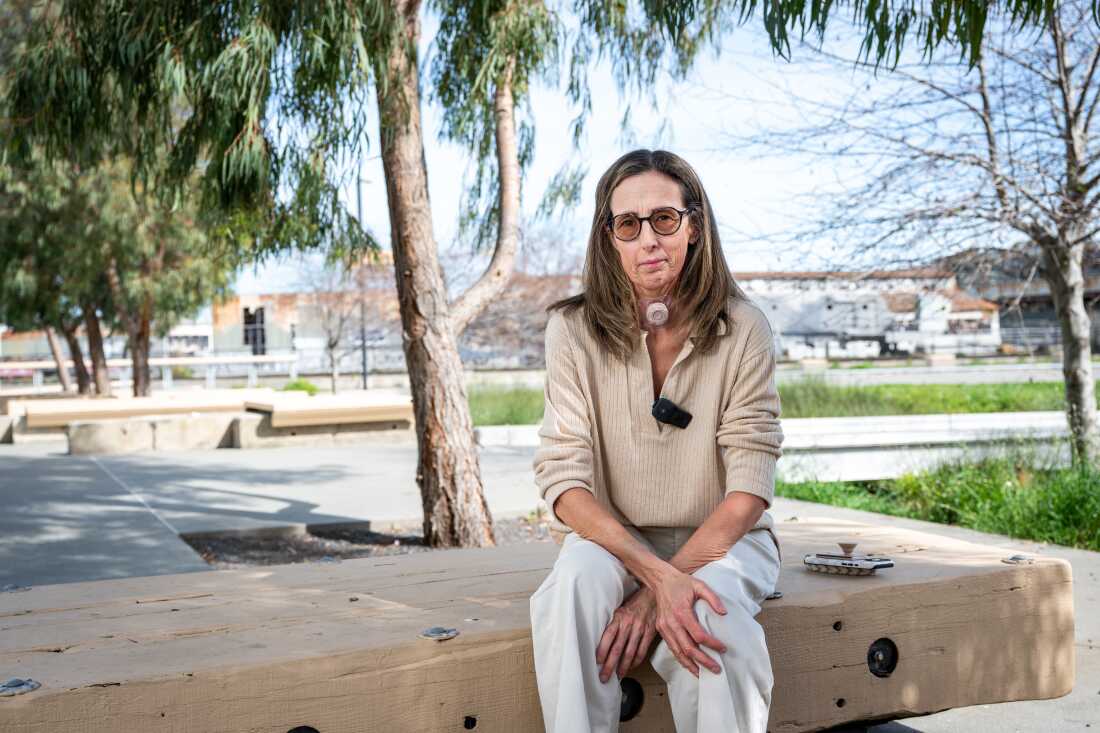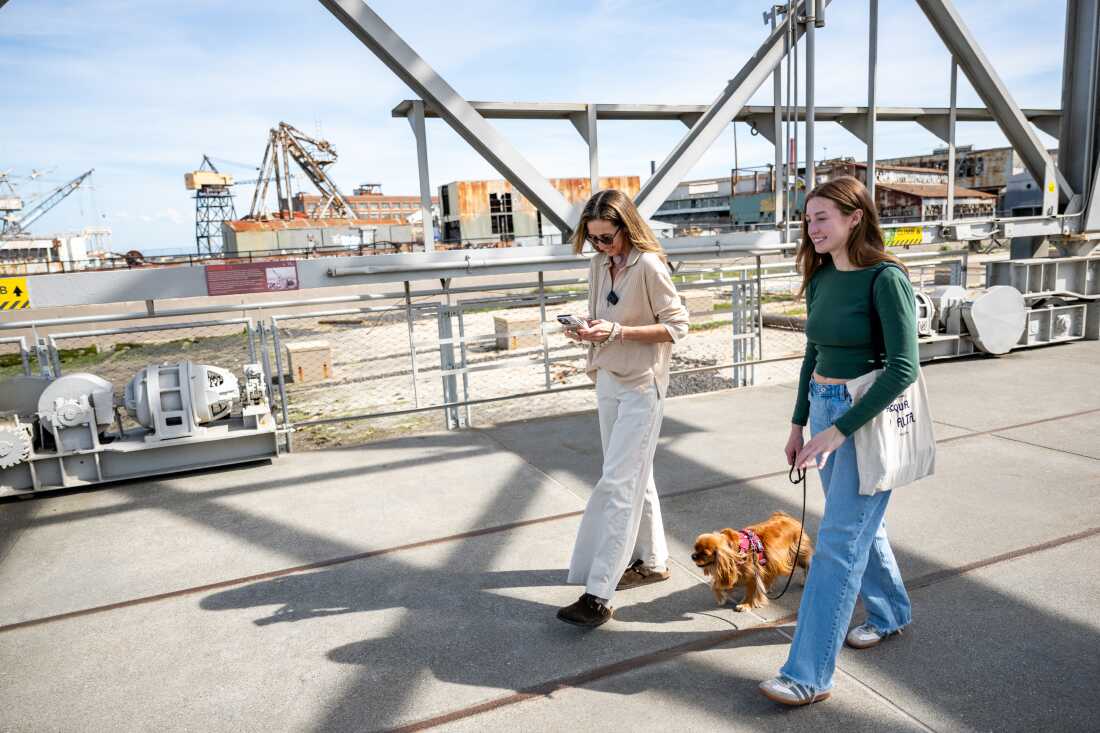
Sonya Sotinsky sits at Crane Cove Park in San Francisco on March 25. Sotinsky was identified with Stage 4 tongue most cancers and underwent surgical procedure to take away her tongue, larynx and different buildings. She then labored with researchers to create an AI-generated voice utilizing previous recordings of her speech.
Beth LaBerge/KQED
cover caption
toggle caption
Beth LaBerge/KQED
When medical doctors informed her they needed to take away her tongue and voice field to avoid wasting her life from the most cancers that had invaded her mouth, Sonya Sotinsky sat down with a microphone to report herself saying the issues she would by no means once more have the ability to say.
“Comfortable birthday” and “I am happy with you” topped the phrases she banked for her husband and two daughters, in addition to “I will be proper with you,” meant for purchasers on the structure agency she co-owns in Tucson, Arizona.
Eager about the grandchildren she desperately hoped to see born at some point, she additionally recorded herself studying greater than a dozen kids’s books, from Eloise to Dr. Seuss, to at some point play for them at bedtime.
However one of many largest classes of sound recordsdata she banked was a string of curse phrases and filthy sayings. If the voice is the first expression of character, sarcasm and profanity are important to Sotinsky’s.
“When you may’t use your voice, it is extremely, very irritating. Different individuals undertaking what they assume your character is. I’ve silently screamed and screamed at there being no scream,” stated Sotinsky in a latest interview, referring to rudimentary voice know-how or writing notes by hand. “What the literal you-know-what?”
Combating invasive oral most cancers at age 51 pressured Sotinsky to confront the existential significance of the human voice. Her distinctive intonation, cadence and slight New Jersey accent, she felt, had been fingerprints of her id. And she or he refused to be silenced.

Sonya Sotinsky makes use of an app on her telephone to speak together with her daughter Ela Fuentevilla at Crane Cove Park in San Francisco on March 25.
Beth LaBerge/KQED
cover caption
toggle caption
Beth LaBerge/KQED
Whereas her medical doctors and insurance coverage firm saved her life, they confirmed little curiosity in saving her voice, she stated. So she set out on her personal to analysis and establish the bogus intelligence firm that might. It used the recordings Sotinsky banked of her pure voice to construct a precise duplicate now saved in an app on her telephone, permitting her to sort and converse as soon as once more with a full vary of sentiment and sarcasm.
“She acquired her sass again,” stated Sotinsky’s daughter, Ela Fuentevilla, 23. “After we heard her AI voice, all of us cried, my sister, my dad and I. It is loopy comparable.”
“Your voice is your id”
It took near a 12 months for medical doctors to catch Sotinsky’s most cancers. She complained to her orthodontist and dentist a number of occasions about jaw ache and an odd sensation underneath her tongue. Then water started dribbling down her chin when she drank. When the ache acquired so intense she may now not converse on the finish of every day, Sotinsky insisted her orthodontist take a more in-depth look.
“A shadow forged over his face. I noticed it when he leaned again,” she stated, “that look you do not wish to see.”
That is when she began recording. Within the 5 weeks between her prognosis and surgical procedure to take away her whole tongue and voice field – in medical phrases, a complete glossectomy and laryngectomy – she banked as a lot of her voice as she may handle.
“Your voice is your id,” stated Dr. Sue Yom, a radiation oncologist at UC-San Francisco, the place Sotinsky acquired therapy. “Communication shouldn’t be solely how we specific ourselves and relate to different individuals, but in addition how we make sense of the world.”
“When the voice is now not out there, you may’t hear your self considering out loud, you may’t hear your self interacting with different individuals,” Yom stated. “It impacts how your thoughts works.”
Individuals who lose their voice field, she added, are at increased threat for long-term emotional misery, melancholy and bodily ache in contrast with those that retain it after most cancers therapy. Near a 3rd lose their job, and the social isolation will be profound.
Most laryngectomy sufferers study to talk once more with an electrolarynx, a small battery-operated field held towards the throat that produces a monotonic, mechanical voice. However with no tongue to form her phrases, Sotinsky knew that would not work for her.

Dr. Sue Yom, a radiation oncologist, stands with a radiotherapy system used to ship exact, high-dose radiation therapies for most cancers sufferers on the College of California San Francisco’s Mission Bay medical heart on Could 16.
Beth LaBerge/KQED
cover caption
toggle caption
Beth LaBerge/KQED
When Sotinsky had her surgical procedure in January 2022, AI voices had been nonetheless of their infancy. The perfect know-how she may discover yielded an artificial model of her voice, however it was nonetheless flat and robotic, and others strained to know her.
She acquired by till mid-2024, when she examine tech firms utilizing generative AI to duplicate an individual’s full vary of pure inflection and emotion.
Whereas firms can now recreate an individual’s voice from snippets of previous dwelling motion pictures or perhaps a one-minute voicemail, half-hour is the candy spot.
Sotinsky had banked hours in her kids’s e-book readings.
“Eloise saved my voice,” Sotinsky stated.
Now she sorts what she desires to say right into a text-to-speech app on her telephone, referred to as Whisper, which interprets and broadcasts her AI voice via transportable audio system.

Sonya Sotinsky typically makes use of a conveyable keyboard to speak utilizing the text-to-speech software program on her telephone.
Beth LaBerge/KQED
cover caption
toggle caption
Beth LaBerge/KQED
Most medical doctors and speech therapists who work with head and neck most cancers sufferers do not understand AI software program can be utilized this fashion, Yom stated, and with their give attention to saving lives they typically do not have the bandwidth to encourage sufferers to report their voices earlier than they lose them in surgical procedure.
Medical insurance firms likewise prioritize therapies that stretch life over people who enhance its high quality — and sometimes keep away from overlaying new applied sciences till information proves their actuarial worth.
Sotinsky and her daughter spent months wrangling with claims adjusters at Blue Cross Blue Protect of Arizona, however the insurer refused to reimburse Sotinsky for the $3,000 she spent on her preliminary assistive talking know-how.
“Apparently, having a voice shouldn’t be thought-about a medical necessity,” Sotinsky quipped, her AI voice edged with sarcasm.
Sotinsky now pays the $99 month-to-month charge for her AI voice clone out of pocket.
“Whereas well being plans cowl each routine and life-saving care, assistive communication units are sometimes not coated,” stated Teresa Joseph, a spokesperson for Blue Cross Blue Protect of Arizona. “As AI gives alternatives to impression well being, we think about that protection standards will evolve nationally.”
How analysis would possibly result in insurance coverage protection
Sotinsky resolved to make use of her newfound voice to assist others regain theirs. She stepped again from her work in structure and constructed two web sites detailing her voice banking journey — voicebanknow.com and glossectomygirl.com. She tells her story at conferences and webinars, together with an oncology convention in Denver that Yom organized for 80 scientists.
One physician who attended, Jennifer De Los Santos, was so impressed by listening to Sotinsky’s voice that she started laying the groundwork for a medical trial on the impression AI know-how has on sufferers’ communication and high quality of life. That sort of analysis may generate the information well being insurers must measure actuarial worth.
“And subsequently justify protection by insurance coverage,” stated De Los Santos, a head and neck most cancers researcher and professor at Washington College in St. Louis.
Breast most cancers survivors confronted an identical battle within the Nineteen Eighties and ’90s, she added. Insurers initially refused to cowl the price of breast reconstruction after a mastectomy, calling the process beauty and pointless.
It took years of affected person advocacy and thoroughly crafted information displaying reconstruction had a profound impression on girls’s bodily and emotional well-being earlier than the federal authorities mandated insurance coverage protection in 1998.
Each De Los Santos and Yom stated analysis information on AI voice clones will doubtless comply with an identical path, ultimately proving {that a} absolutely functioning, natural-sounding voice can result in not solely a greater life, however an extended one.

Sonya Sotinsky has constructed two web sites detailing her expertise in voice banking and tells her story at conferences, together with an oncology convention in Denver for 80 scientists.
Beth LaBerge/KQED
cover caption
toggle caption
Beth LaBerge/KQED
In latest months, Sotinsky’s AI voice actually helped save her life. Her most cancers had resurged in her lungs and liver. Her voice allowed her to speak together with her medical doctors and take part absolutely in creating the therapy plan. It confirmed her simply how “medically essential” having a voice is.
She observed that medical doctors and nurses took her extra severely. They did not tune out the way in which individuals typically did when she relied on her extra robotic, synthesized voice. It appeared they noticed her as extra absolutely human.
“If somebody can solely talk utilizing just a few phrases at a time, and never elaborate and interface extra absolutely, it is pure you could’t detect that they’ve extra depth of thought,” she stated. “Having the ability to dialogue with my care staff in a extra seamless method is important.”
Whereas medical doctors efficiently handled her newest spherical of most cancers, Sotinsky, now 55, stated she is confronting her odds in a brand new method, going through the truth that she’s going to doubtless die a lot prior to she desires.
Another time, she realized how essential her voice is for sustaining perspective on life and a humorousness within the face of dying.
“I are likely to neglect and assume I’m superb, when in actuality, that is endlessly now. Emotionally, you begin to get cocky once more and this was like, ‘Whoa, b****, we ain’t enjoying.’ This most cancers is actual,” Sotinsky stated, typing her subsequent phrase with a mischievous grin.
“Sarcasm is a part of my love language.”
This story comes from NPR’s well being reporting partnership with KQED and KFF Well being Information.

